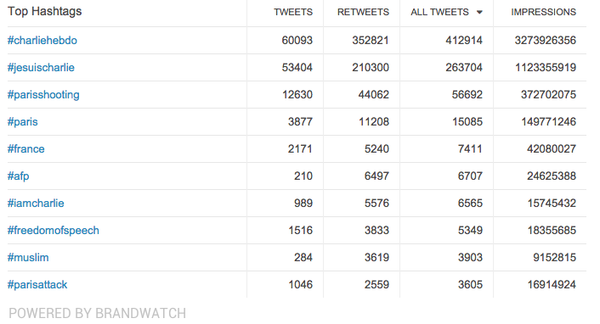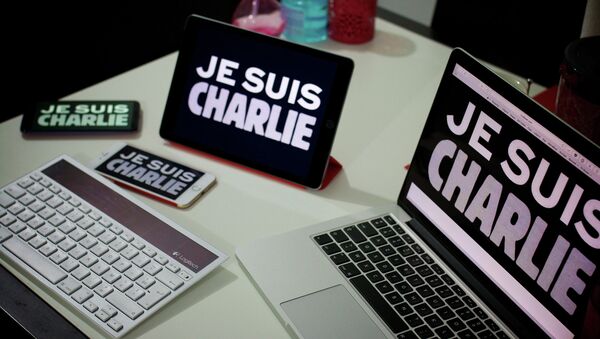However, just as many have condemned the shooting, others have taken to the same digital channels to applaud it, with supporters of terrorist groups cheering on the attacks, sparking questions about whether social media is increasingly becoming an online platform for terrorist rhetoric?
#JesuisCharlie and #CharlieHebdo
In the aftermath of the attack, which has so far claimed the lives of 10 journalists and two policemen, with reports of more casualties on Friday, many people took to social media to search for information about what had happened and to comment and share opinions on the array of photos and video footage shared on Twitter and Facebook.
Within hours, the Twitter hashtags #JesuisCharlie (‘I am Charlie' in French) and #CharlieHebdo had been set up and were gathering popularity, with the tags used as a forum for people to send messages of support for those killed in the attacks.
Since the Paris shooting on Wednesday, there have been more than 2.5 million mentions of the event on social media, with a sampling of 25 percent of available data showing significant hits for the #CharlieHebdo and #JesuisCharlie hashtags by Thursday evening, according to social media research group Brandwatch.

#JesuisCharlie has gone on to become the unofficial message for freedom of speech, with demonstrators in cities all over the world holding placards with the hashtag in thick print, showcasing the extent to which the message has spread.
Moscow vigil mourns victims of #CharlieHebdo shooting http://t.co/IH752IxFqD #jesuischarlie pic.twitter.com/GAO5ft2Jkx
— The Moscow Times (@MoscowTimes) January 9, 2015
Dhiraj Murthy, reader in sociology at Goldsmiths University, says that it isn't unusual to see a spike in social media activity during times of crisis, saying that people often use these online platforms to seek some form of emotional support.
"I found that some users use social media as a form of 'self therapy', an outlet to communicate their anxieties or stresses during crisis and to receive direct or indirect support."
The use of Twitter hastags to show public solidarity follows the #Illridewithyou campaign, whereby people tweeted against anti-Islamic sentiment stirred up by the Sydney café siege, which resulted in the deaths of two hostages and the gunman.
Twitter: the propaganda platform?
Just, as the #JesuisCharlie hashtag has been adopted as a banner for solidarity and free speech, social media supporters of ISIL and al-Qaeda have been taking advantage of the increased publicity and media traffic to spread their own messages following the Charlie Hebdo shooting in Paris.
J.M. Berger, researcher of social media extremism, tweeted that: "Top ISIS [ISIL] figures on social media [are] pushing users to make a run on the #CharlieHebdo hashtag, posting older propaganda with it," indicating that ISIL officials were attempting the hijack the increased social media traffic to spread propaganda and drum up more support.
Top ISIS figures on social media pushing users to make a run on the #CharlieHebdo hashtag, posting older propaganda with it.
— J.M. Berger (@intelwire) January 7, 2015
This comes amid claims from Mr. Berger that al-Qaeada supporters were running an ‘AQ invading France' hashtag, as an alternative to #JesuisCharlie.
Dhiraj Murthy from Goldsmith University says that trending topics naturally become popular targets for people looking to spread a message — even terrorists.
"Academic work on social media has shown that ISIS has made social media a central aspect of its recruitment and propaganda machine… I argue that the openness of social media makes it able to be used by any side (including extremists, spammers and trolls). This can have real consequences on civil society as people increasingly turn to social media as a community space to interact publicly."
As a result of increased social media use among terrorist groups, intelligence agencies and monitor services now track the social media activity of jihadists, with the hope of pre-empting any potential attack.
This was seen recently with a New Zealander jihadist, allegedly fighting with ISIL, who was caught out tweeting while forgetting to turn off the location service function on his Twitter account.
Intelligence research group iBrado had been tracking Mark John Taylor's Twitter account and wrote in a blog post that: "[Taylor's] ignorance and the ignorance of others has been an advantage to intelligence agencies around the world looking to protect their nations and track the process of ISIS [ISIL].
As social media platforms such as Twitter and Facebook increasingly bring live events and disasters into our own living rooms, it seems that all types of people will try and spread their own messages across the digital world.
And although many people will neglect terrorist propaganda and rhetoric, research has shown that these messages do tend to have an impact in shaping public perceptions, whether they are positive or negative.


